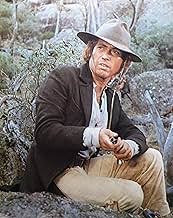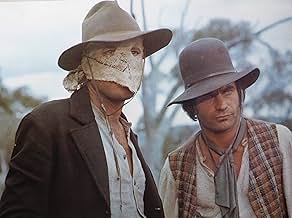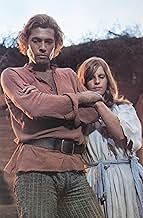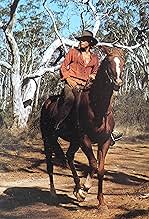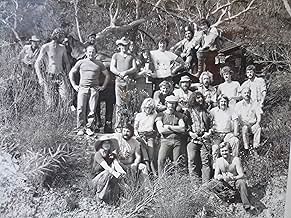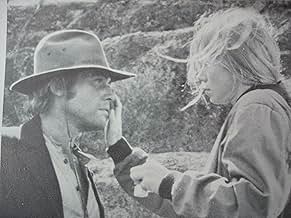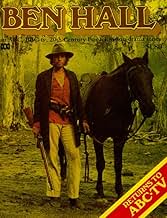Ajouter une intrigue dans votre langueFollows the life of the Australian bushranger Ben Hall.Follows the life of the Australian bushranger Ben Hall.Follows the life of the Australian bushranger Ben Hall.
Histoire
Le saviez-vous
Commentaire en vedette
This series represents both the coming of age of historical drama on Australian television and the serious presentation of known facts, as opposed to supposition and guesswork, in a TV series. At the time of it's release the Ben Hall series was a landmark in quality television drama and brought together a cast of players well known for the integrity of their work. Ben Hall and Ned Kelly were the most significant figures in Australian Bushranging ("bushranger" is the Australian equivalent term to the American "Outlaw"). This Australian bushranging period parallels the outlawry of America's Billy The Kid, the James Gang and others, both in cheek and in time.
Many Australian historians will point out the similarities and more importantly the significant differences between the Australian experience and the American experience. The American outlaws were after money or fame or both, and were often disaffected misfits in a short, wild and almost lawless period in the "wild west". Many were murderers without any respect for their victims or the law. Their reign was often short, bloody and callous. The Australian experience was, on the other hand bolder and longer, and irrevocably tied to the convict era and emancipation, and the emergence of the first true white Australian generations who, like the American patriots, believed in their right as native-born Australians to live without the harshness of British rule and influence.
The series spans the late 1850s to 1863, the year of Halls appalling death at the hands of friends and foe. It was said he never shot a man despite leading a gang that held up entire towns for days at a time, robbing the banks and gold escorts, the wealthy and the police themselves. Dialogue for the series no doubt borrowed heavily from a 1950s account (a popular novel more or less, ridiculed by many despite it's clever use of historical documents) by one Frank Clune. He was a writer of popular material but in my mind provided the basis for almost all accounts that followed and certainly filled in the gaps without which a series of this nature would never have been possible.
The Ben Hall story is factual to life at the times, I have covered this territory and can vouch for the background and events. The acting, led by Finch (see Hitchcock's "Frantic" is solid and plausible for its time, the sets were true to photographic records from the1850s and 60s and the strongest point that should be made here is that the life of this man and his gang was far more emotive and interesting (and is factual) than that of most of America's so-called outlaws. Local historians tend to take sides - either the police or the bushrangers - but the series sets what I consider a fair balance.
Hall was certainly unfortunate in that the police treated him unfairly, but in later years by Ned Kelly mimicked some of Halls exploits. Kelly was also treated badly by the police but, it seems, there may well have been a stronger argument for the police side in his case.
If you get the chance to see this series it is certainly worth the time, despite being a peculiarly Australian product. If you don't get the chance and you are interested in outlawry from this period anywhere in the world Australian Bushranging makes a great subject for further exploration.
Many Australian historians will point out the similarities and more importantly the significant differences between the Australian experience and the American experience. The American outlaws were after money or fame or both, and were often disaffected misfits in a short, wild and almost lawless period in the "wild west". Many were murderers without any respect for their victims or the law. Their reign was often short, bloody and callous. The Australian experience was, on the other hand bolder and longer, and irrevocably tied to the convict era and emancipation, and the emergence of the first true white Australian generations who, like the American patriots, believed in their right as native-born Australians to live without the harshness of British rule and influence.
The series spans the late 1850s to 1863, the year of Halls appalling death at the hands of friends and foe. It was said he never shot a man despite leading a gang that held up entire towns for days at a time, robbing the banks and gold escorts, the wealthy and the police themselves. Dialogue for the series no doubt borrowed heavily from a 1950s account (a popular novel more or less, ridiculed by many despite it's clever use of historical documents) by one Frank Clune. He was a writer of popular material but in my mind provided the basis for almost all accounts that followed and certainly filled in the gaps without which a series of this nature would never have been possible.
The Ben Hall story is factual to life at the times, I have covered this territory and can vouch for the background and events. The acting, led by Finch (see Hitchcock's "Frantic" is solid and plausible for its time, the sets were true to photographic records from the1850s and 60s and the strongest point that should be made here is that the life of this man and his gang was far more emotive and interesting (and is factual) than that of most of America's so-called outlaws. Local historians tend to take sides - either the police or the bushrangers - but the series sets what I consider a fair balance.
Hall was certainly unfortunate in that the police treated him unfairly, but in later years by Ned Kelly mimicked some of Halls exploits. Kelly was also treated badly by the police but, it seems, there may well have been a stronger argument for the police side in his case.
If you get the chance to see this series it is certainly worth the time, despite being a peculiarly Australian product. If you don't get the chance and you are interested in outlawry from this period anywhere in the world Australian Bushranging makes a great subject for further exploration.
- danburke
- 10 nov. 2006
- Lien permanent
Meilleurs choix
Connectez-vous pour évaluer et surveiller les recommandations personnalisées
Détails
Contribuer à cette page
Suggérer une modification ou ajouter du contenu manquant


